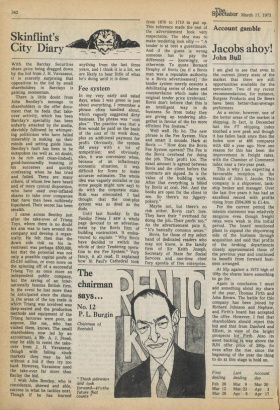Skinflint's City Diary
With the Barclay Securities share price being dragged down by the bid from J. H. Vavasseur, it is scarcely surprising that opposition to the bid by small shareholders in Barclays is gaining momentum.
There is little doubt from John Bentley's message to shareholders in the offer document that he feels that takeover activity, which has been Barclay's speciality has been unfairly attacked by the media, slavishly followed by whimpering politicians who have failed miserably in making up their minds and setting guide lines. Bentley's fault has been to be outspoken (as well as, no doubt, to be rich and clean-limbed), good-humouredly boasting of his successes and quickly confessing when he has tried and failed. There are many others, of whom few have heard and of more cynical disposition, who have used over-inflated shares to take over companies that have then been ruthlessly liquidated. Their secret has been stealth.
I came across Bentley just after the take-over of Triang Toys, where there is no doubt his aim was to turn around the company and develop it organically. He felt then that the down side risk on his investment was perhaps 000,000, but that the potential was not only a possible capital profit of 0-£10 million, or even more on the spinning off of a successful Triang Toy as once more an independent public company, but the saving of an internationally famous British firm. In the event he lost more than he anticipated since the slump in the areas of the toy trade in which Triang was involved was deep-seated and the production methods and equipment of the Triang factories were poor, as anyone, like me, who has visited them, knows. The small shareholders now led by an accountant, a Mr. A. J. Steed, may be able to resist the takeover from J. H. Vavasseur, though with falling stock markets they may be left without a bid if they try too hard. However, Vavasseur need the take-over far more than Baclay the bid.
I wish John Bentley, who is considerate, shrewd and able, success in what he tackles next. Though if he has learned anything from the last three years, and I think it is a lot, we are likely to hear little of what he's doing until it is done.
Fee system
In my very early and salad days, when I was green in just about everything, I remember a phrase often bandied about, which vaguely suggested dirty business. The phrase was "cost plus." The practice was that a firm would be paid on the basis of the cost of its work done, plus an additional payment for profit. Obviously, the system did away with a lot of competition; and obviously, also, it was convenient when, because of an inflationary economic situation, it was difficult for firms to make accurate estimates. The whole idea was vaguely socialist or (as some people might now say) to do with the corporate state. Risk was eliminated. I had thought that the cost-plus system was as dead as the dodo.
Until last Sunday. In the Sunday Times I saw a whole page devoted to an advertisement by the Bovis firm of building contractors. It endeavoured to explain "Why Bovis have decided to switch the whole of their Tendering operation to the Fee System." Very fancy, it all read. It explained how St Paul's Cathedral took from 1670 to 1710 to put up.
This reference made the rest of the advertisement look very respectable. The idea was to make tendering look silly — "A tender is at best a guesstimate.
And if the guess is wrong someone has to pay the difference — knowingly, or otherwise. To quote Bernard Heaphy of Bovis [as if a Bovis man was a reputable authority in a Bovis advertisement] 'the tender system merely ensures a debilitating series of claims and counterclaims which make the original tender price irrelevant.' Bovis don't believe that this is an intelligent way to do business. So from today they are giving up tendering altogether in favour of the far more efficient Fee System."
Well well. Ho ho. The new phrase is the Fee System. Nice and smart it sounds. Hark at Bovis — "How does the Bovis Fee System operate? The Fee is the Bovis overhead for doing the job. Their profit too. The exact amount is agreed between Bovis and the client before the contracts are signed. So is the value of the building work.
After that everything is billed by Bovis at cost. Net. And the books are open for the client to see. So there's no jiggerypokery."
Maybe not, but there's no risk either. Bovis can't lose.
They have their "overhead for doing the job.. Their profit too." As the advertisement puts it, "It's basically comomn sense."
Bovis, for those of my select band of dedicated readers who may not know, is the family firm of Sir Keith Joseph, Secretary of State for Social Services and one-time chief Tory apostle of free enterprise.


































 Previous page
Previous page